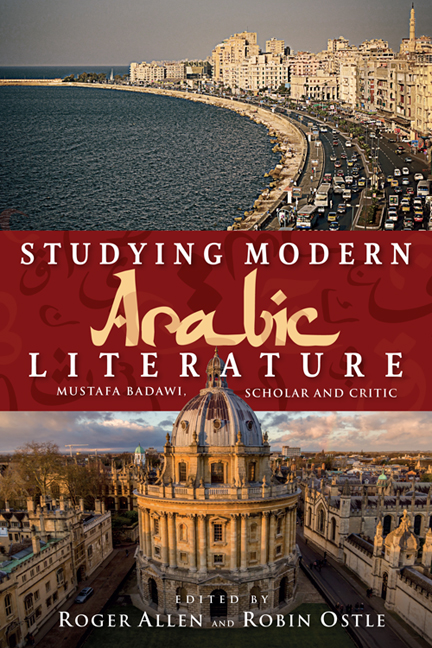Book contents
- Frontmatter
- Contents
- List of Figures
- Introduction
- Part I Alexandria to Oxford
- Part II The Academic Legacy
- 5 Beginning and End: Exploring the Qur'anic ‘Grand Story’
- 6 Modern Arabic Literature as Seen in the Late Nineteenth Century: Jurji Murqus's Contribution to Korsh and Kirpichnikov's Vseobshchaya Istoria Literatury
- 7 The ‘Second Journey’ (Al-Rihla al-thaniya) of Muhammad al-Muwaylihi's Hadith 'Isa Ibn Hisham Revisited
- 8 Ataturk Becomes 'Antar: Nationalist-vernacular Politics and Epic Heroism in 1920s Egypt
- 9 Jewish Arabs in the Israeli Asylum: A Literary Reflection
- 10 Strange Incidents from History: Youssef Rakha and his Sultan's Seal
- 11 Towards a Comparative Approach to Arabic Literature
- 12 Does Literature Matter? The Relationship between Literature and Politics in Revolutionary Egypt
- Notes on the Contributors
- Index
12 - Does Literature Matter? The Relationship between Literature and Politics in Revolutionary Egypt
from Part II - The Academic Legacy
Published online by Cambridge University Press: 05 August 2016
- Frontmatter
- Contents
- List of Figures
- Introduction
- Part I Alexandria to Oxford
- Part II The Academic Legacy
- 5 Beginning and End: Exploring the Qur'anic ‘Grand Story’
- 6 Modern Arabic Literature as Seen in the Late Nineteenth Century: Jurji Murqus's Contribution to Korsh and Kirpichnikov's Vseobshchaya Istoria Literatury
- 7 The ‘Second Journey’ (Al-Rihla al-thaniya) of Muhammad al-Muwaylihi's Hadith 'Isa Ibn Hisham Revisited
- 8 Ataturk Becomes 'Antar: Nationalist-vernacular Politics and Epic Heroism in 1920s Egypt
- 9 Jewish Arabs in the Israeli Asylum: A Literary Reflection
- 10 Strange Incidents from History: Youssef Rakha and his Sultan's Seal
- 11 Towards a Comparative Approach to Arabic Literature
- 12 Does Literature Matter? The Relationship between Literature and Politics in Revolutionary Egypt
- Notes on the Contributors
- Index
Summary
This chapter investigates the complex links between literature and politics in contemporary Egypt. Literature here is used to mean works of the creative imagination (poems, short stories, novels and so on). That literature is political is beyond dispute inasmuch as its production and consumption cannot occur in a societal vacuum. In Egypt, the very fundamentals of how, what and where one publishes are themselves political decisions in a culture industry that has been the site of successive battles between artists and the establishment. What is less clear is how closely literature is (or should be) tied to the service of a particular political agenda or connected to the masses, and to what extent literature can and does succeed in influencing political reality. Many pundits have attributed widespread failure to predict Egypt's revolution to the dearth of warning signs, but the seeds of revolution were apparent in cultural production in the years leading up to the events of 2011. Novels, poems, films and soap operas drove home the reality and consequences of pervasive corruption in a dysfunctional state. Creative works of the imagination have some advantages over factual forms of discourse. As art and as make-believe, they enjoy a greater capacity to circumvent the various kinds of censorship to which other forms of discourse are subject under authoritarian regimes; they have artistic licence to distill, stress or exaggerate particular features of the world they choose to represent using myriad devices for extra effect, in addition to the simple power of selective presentation; and, finally, their aesthetical qualities have the power to speak to hearts as well as minds. The Afghan writer Atiq Rahimi has described the relationship between literature and politics as ‘the power of words against the words of power’.
This chapter attempts to describe, theorise and, to a limited extent, quantify the nature of the relationship between politics and literature in Egypt from both angles of this dialectic. The flurry of literary activity that accompanied the 2011 revolution (and its ongoing aftermath) is generally subject to two assumptions: that it gave expression to the pulse of the Egyptian nation, as new works were created and old works resurfaced; and that, more than just recording the uprising, it formed an integral part of it, and possibly even played a role in inspiring and fuelling it.
- Type
- Chapter
- Information
- Studying Modern Arabic LiteratureMustafa Badawi, Scholar and Critic, pp. 194 - 217Publisher: Edinburgh University PressPrint publication year: 2015



